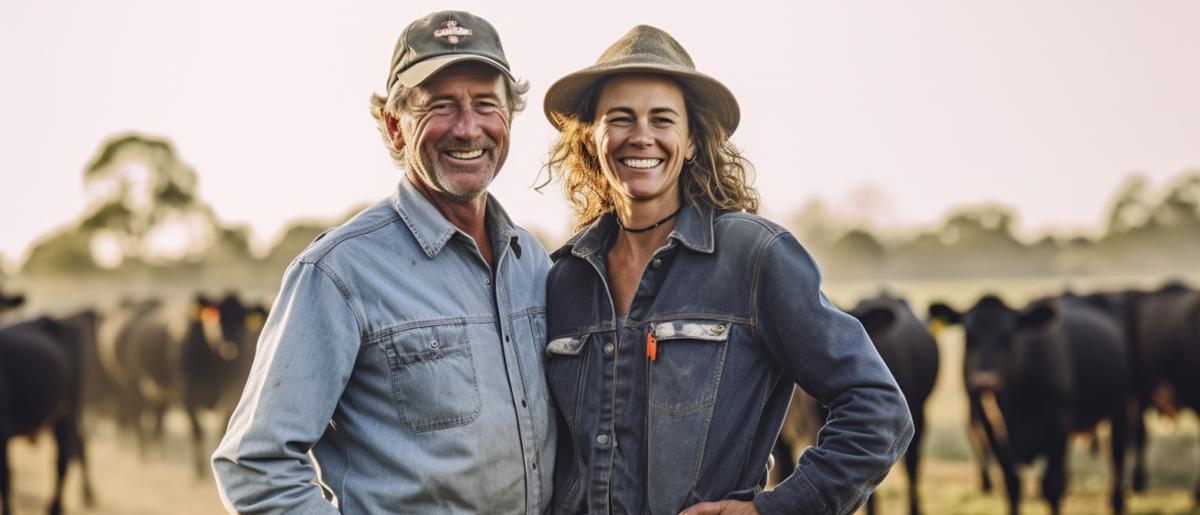

The rigourous, rewarding, and often unpredictable landscape of cattle farming in Australia offers various unique economic opportunities. Cattle farmers take on significant tasks from raising livestock, maintenance of land to ensure productivity, to managing an intricate web of supply and demand. Within this realm, financial agility often becomes a cornerstone of sustainable growth and operational efficiency. In particular, business loans emerge as vital resources for many cattle farmers. They offer solvency during periods of financial strain – a common occurrence given the volatility of agricultural markets and unpredictable weather patterns. In addition, they provide the necessary capital for growth-oriented investments such as technology integration, land expansion, or livestock acquisition. Indeed, business loans serve as essential components in the proactive financial strategy, not just instruments of emergency recourse. They empower Australian cattle farmers, fostering resilience, fuelling progress, and facilitating a level of financial security hard to achieve otherwise.
Compare over 40+ lenders with one application.
Cattle farming in Australia plays a crucial role in the nation’s economy. Beef from Australia is globally recognised and reputable, appreciated for its superior standard. Thanks to our hard-working cattle farmers, Australia proudly ranks as one of the world's top beef exporters. Contributing significantly to our GDP, the cattle farming industry is vital to sustaining and boosting the Australian economy. Every year, thousands of jobs across various sectors such as farming, processing facilities, transport and retail are available thanks to this sector. Equally significant is the value cattle farmers bring to rural communities. Employment opportunities provided by cattle farming help to sustain local economies. It's not only the jobs on the farm; think transport drivers, local butcher shops, farm equipment sales and maintenance, among others, that are supported by this industry. Above all, Australian cattle farmers are guardians of the land. The commitment to sustainable and ethical farming practises ensures the continuity of our beautiful landscape. Long gone are the days of clear-felling and overgrazing. Today's cattle farmer is an environmental custodian, using innovative methods to preserve and enhance the biodiversity of their land. Therefore, the value and impact of cattle farmers in Australia are felt far beyond their farm gates. They are a primary thread in the economic and social fabric of our great country. Their devotion to their land and livestock assures us of quality beef and dairy products on our tables and greatly fortifies the Australian economy and its rural communities.
Learn about eligibility and how to apply.
Running a cattle farm in Australia isn't always a walk in the park. About as unpredictable as the weather, the industry is beset with challenges that can turn even the strongest steer into a skittish calf. One of the foremost obstacles is dealing with the harsh and often erratic Australian climate. Drought poses a considerable risk to cattle farmers, with many facing several dry seasons in a row. This leads to poor pasture conditions, impacting the farmers' ability to feed and grow their herds. In addition to climatic challenges, there are financial burdens to bear. Upfront costs required for cattle farming are significant. Land, livestock, machinery, and facilities all come with hefty price tags. Often, these costs are compounded by fluctuating market prices for beef and dairy products, often driven by international trade agreements and demand. Another complex issue is the prevalent biosecurity risks. Ensuring the health of the herd and preventing disease spread can be a daunting task. From foot and mouth disease to bovine tuberculosis, these threats can have disastrous effects on a farm. Farmer's resources may be strained in trying to comply with stringent regulatory standards and in taking preventive measures against these diseases. Lastly, the changing societal attitudes towards animal welfare and environmental sustainability add another layer of challenge. There is a rising expectation on farmers to adhere to sustainable and ethical farming practises, an adjustment that requires more resources - both financial and human. The situation alludes to the potential need for external financial support, like business loans, to help navigate these waters and ensure sustainable business practises.
Calculate your repayment estimates and more.
Access to adequate financing can significantly impact the progression of cattle farming businesses. Securing a business loan opens up gateways for improvements, expansions, and handling unexpected downturns in market conditions. The flexibility offered by these loans enable cattle farmers to maintain their seamless operations, invest in advanced equipment, or even fund the purchase of additional livestock. A business loan is a lifeline in unstable times, assisting in smooth cash flow during off-peak seasons. Cattle farmers often experience cyclical cash flow issues, with incomes becoming somewhat unpredictable, primarily due to ever-changing market prices, seasonal factors or unprecedented situations like droughts or diseases. With a business loan, they can bridge this income gap, ensuring continued operations and maintenance of the herd's well-being. Additionally, the advancement of cattle farming practises is crucial for competitiveness within this ever-evolving industry. Many business loans offer the prospect of investment in technology, such as automated feeding systems or precision farming tools. This progressive approach enables cattle farmers to increase productivity and efficiency, yielding higher profits, and ultimately driving business growth. Such prospects underscore the significance of business loans for cattle farmers.
Cattle Farmers in Australia can access various forms of business loans tailored to their unique needs. These include term loans for substantial investments, working capital loans to cover fluctuating expenses, and equipment finance loans specifically for purchasing farming equipments. Each loan type is designed to support the various facets of their operations.
There are several types of business loans in Australia that can benefit Cattle Farmers. Each of these loan types has its unique features, advantages, and potential disadvantages. Here are some of the most common types of business loans for Cattle Farmers:
Equipment Finance
Useful for cattle farmers, this loan type enables them to buy necessary machinery and tools without a significant upfront cost. Equipment purchased serves as collateral, reducing the lender's risk.
Livestock Finance
Caters exclusively to the cattle farming sector by providing funds for buying livestock. It lets farmers broaden their herd without draining resources, contributing to business expansion.
Working Capital Loans
These are short-term finance options catering to day-to-day business expenses, such as repairing fences, servicing machinery, or covering staff salaries during non-peak farming periods.
Line of Credit
Flexible financing allowing cattle farmers to withdraw funds as they need, up to a certain limit. Interest is only accrued on the used funds, best for handling uncertain costs like vet bills or unforeseen repairs.
Vehicle Finance
A valuable loan type for farmers needing to purchase or update farming vehicles. The new vehicle typically acts as the loan security.
Overdraft Facility
Attached to the business account, it allows cattle farmers to draw more funds than available in their account. Usually used for short-term cash flow needs, it's similar to a line of credit but linked directly to the bank account.
Business Credit Cards
Provide a convenient way to manage business-related expenses. They offer a range of benefits such as reward points and insurance covers but should be used judiciously due to high interest rates.
Invoice Finance
This facility allows farmers to borrow against unpaid invoices, providing immediate access to funds and improving cash flow.
Trade Finance
Assists cattle farmers in making transactions with suppliers and customers, both domestically and internationally, reducing the risk and smoothing out cash flow issues.
Commercial Property Loan
Ideal for those looking to purchase land or properties for farming activities. The terms are generally longer, allowing cattle farmers to spread the cost over many years.
Business loans for cattle farmers can be pivotal in expanding farming operations, like purchasing additional cattle or upgrading machinery. They may also assist with balancing cash flow during market fluctuations, helping farmers in Australia thrive in a competitive industry. No dedicated title is required for this brief section.
Here are some common reasons Cattle Farmers use business loans:
Land Acquisition
Purchasing additional land can enable cattle farmers to expand their operations, increase their herd size, and meet the growing demand for beef in Australia and internationally. As land values often increase, this can also represent a long-term investment.
Livestock Purchase
Loans can be used to invest in high-quality livestock. Whether replacing old stock or expanding the herd, new, healthy cattle can significantly improve farm productivity and profitability.
Farm Equipment Upgrade
Technological advancements in farm equipment can help cattle farmers increase their efficiency and yield. Business loans can be used to finance the purchase of modern machinery and equipment.
Farm Infrastructure Development
From fencing to cattle sheds, water systems to waste management facilities, developing and improving farm infrastructure is critical for the efficient operation of a cattle farm.
Feed and Grain Stock
Ensuring a steady supply of quality feed and grain for the livestock is crucial. Loans can be used to stock up on feed and grain, especially in preparation for the dry season when prices are likely to increase.
Veterinary Care and Herd Health
Maintaining the health of the herd is key to the success of every cattle farm. Business loans can help finance regular veterinary check-ups, vaccinations, and necessary medical treatments.
Drought Management Strategies
In times of drought, business loans can support water-efficient practises, such as irrigation systems, as well as the purchase of supplemental feed and fodder.
Staff Training and Development
Up-skilling staff in the latest cattle farming practises can increase productivity and ensure animal welfare. Business loans can be utilised to organise professional training programmes for employees.
Renewable Energy Installations
Installing renewable energy solutions like solar panels or biogas units can lead to significant cost savings in the long run. Business loans can be used to fund these instalations.
Diversification Inspiring Activities
Diversification into other agricultural activities, like poultry farming or crop cultivation, can help to mitigate risks and increase income streams. A business loan can provide the necessary funds to start these new ventures.
To estimate your monthly repayments and the total cost of the loan, input the loan amount, loan term and interest rate into the calculator below. This helps you plan your budget and choose the most suitable loan terms.
These helpful FAQs will help you find the answers you need. If you can't find what you're looking for, you can request a callback below.